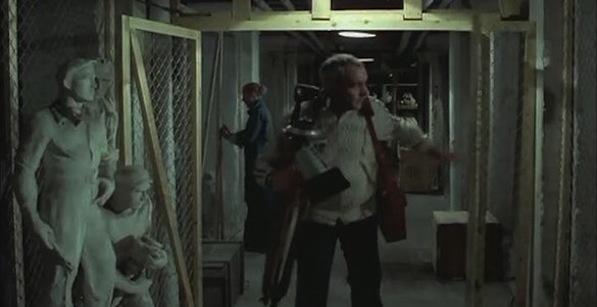We’ve combed the internet to find the most helpful articles and other online resources regarding Andrzej Wajda’s Man of Marble, one of the highlights of his storied career. We hope these insights will enhance your viewing of this landmark film:
Vincent Canby, New York Times:
In Man of Marble, Mr. Wajda, best known here for Kanal (1957) and Ashes and Diamonds (1958), explores the course of Polish Communism from the late, paranoid 40’s, before Stalin’s death (1953) and the political thaw (1956) to the present, when many Communists are virtually indistinguishable from the members of the new bourgeoisie. The movie is a political epic, compassionate and as bitterly funny as a cartoon. (…)
Man of Marble is not, I think, a film that many revolutionary societies could tolerate. Its picture of young radicals growing into smug, self-serving middle-age is not the sort of thing that draws recruits to a cause. But Mr. Wajda is a humanist who refuses to restrict himself to the short view that sees only what is currently acceptable.
Maria Racheva, Film Reference.com:
Wajda manages in this story, masterfully written by Aleksander Scibor-Rylski, to paint a very detailed, ambivalent and strongly emotional picture of the development of his country during the last 30 years, and to portray two generations—fathers and sons—who formed the socialist system in Poland.
The structure of the film is rather sophisticated. Wajda here renounces the use of visual symbols, so typical of his usual style. He replaces the symbols with documentation—chronicles and news items—from the period; his narrative structure consists of three parallel stories, each of them taking place in a different historical time.
In spite of this complicated form, the film enjoyed an enormous audience success. One of the aims of the socialist culture is to educate people to understand an art which participates in the life and the problems of society. The artists themselves, in this case Wajda, feel themselves obliged to function as the consciousness of their compatriots, while at the same time presenting to them refined, aesthetic works.
Don Houston, DVD Talk:
Wajda, himself a victim of the political leanings of corrupt governments over the years, hit this one square on the head. Much like his films on Capitalism and War, the famed director presents a compelling cautionary tale that shows how revisionist history works as well as how the powers that be will distort any truths in order to accomplish their goals. Lest you think the movie is solely about the two political systems so properly skewered here, keep in mind that the themes of corruption and misuse of government resources to bury inconvenient people are particularly fitting in these times, regardless of your political leanings. For all it’s strengths in direction, acting and writing, I think this one is well worth a rating of Highly Recommended.
Acquarello, Strictly Film School:
Andrzej Wajda creates a fascinating study of political opportunism, character analysis, and the filmmaking process under communism in Man of Marble. By juxtaposing the idealism of postwar reconstruction and the cultural climate of 1970s Poland, Wajda chronicles the social reality of revisionist history, and the tragic irony that results from constantly shifting government policies. Note the sharp contrast between the images captured by Burski’s contrived documentary and the individual eyewitness accounts and recovered deleted footage (presumably rejected on “technical grounds”) featured in Agnieszka’s school documentary. The fictional narrative progresses through aggressive, cinema-verite styled filmmaking. The effect is an honest, compassionate, and unsystematic film that deconstructs a fabricated political icon, from the illusion of a national hero to the personal struggle of an idealistic, common man.

To me the film is working on several levels. Agnieszka is a young twenty-something year old. She has no memories of Birkut. For her everything is a history lesson. And so we are getting a story of a younger generation going back to its roots. As one character in the film says, it is good for young people to study history so they don’t repeat the same mistakes.
This is typical of Andrzej Wajda. His entire career has been to document Polish history and all her struggles. I’m sure he wants the youth of society to be familiar with their country’s past.
Krystyna Janda is extremely beautiful and talented. She presents the character as both pushy and manipulative, going to any lengths to get her interview. But Janda makes the character believable. Many young filmmakers are exactly like that. And to think this was her debut acting performance.
As great as these reviews are, the article that takes the cake is Lisa DiCaprio’s essay “Man of Marble. Man of Iron: Polish film and politics,” found on Jump Cut. It amounts to a lengthy viewing companion that will help anyone watching the film.




